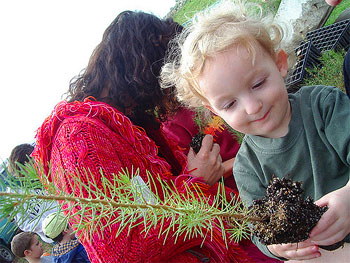
On Tu BiShvat, we celebrate the “New Year of the Trees.” This holiday, which falls on the 15th day (tu) of the Hebrew month of Sh’vat, is also known as the birthday of the trees. We say “Happy birthday” and “Happy new year” to the trees sprouting up after winter and to the flowers beginning to bud in eager anticipation of the spring.
Tu BiShvat falls smack in the middle of winter in North America, but in Israel, the holiday occurs just as the first signs of spring are beginning to emerge from the frozen earth. It’s the time when the trees begin to reawaken after their long winter slumber, when seedlings begin to reach up out of the cold, wet ground, and when the teeniest, tiniest blossoms peek out to say their first hello. The trees will soon be shaking off their icy, winter chill and making fruit for all to eat and enjoy.
That’s why it is customary on Tu BiShvat to eat a variety of fruits, especially fruit that comes from the Land of Israel. In the book of Deuteronomy, we read that Israel is “a land of wheat and barley, vines and figs and pomegranates, a land of oil producing olives and [date] honey.” (Deuteronomy 8:8) Accordingly, we try to incorporate the seven species mentioned – wheat, barley, grapes, figs, pomegranates, olives, and dates, along with many other nuts and delicious fruits – into our Tu BiShvat celebrations.
Some families may choose to gather for a Tu BiShvat seder. Just as we have a structured meal, or seder, on Passover, many also hold a seder on Tu BiShvat as well, marking the transition from winter to spring with food, blessing and beautiful rituals, some of which date back centuries to the mystical Kabbalists of Safed. As we sample fruits for the first time that season – or for the first time ever – we take a moment to offer words of thanks and praise (the Shehecheyanu prayer).
On Tu BiShvat, we not only eat the fruit of the trees, but we plant the trees themselves. We plant trees in our cities and at home – in the backyard perhaps, or at the local synagogue, school, or nearby park. We plant trees in Israel, too, as a sign of our deep love for the land and to connect us to the people and animals that will walk this land in the future. When we plant a tree, we make an investment in our earth and in the generations to come. This Tu BiShvat, try planting a tree in honor of someone you love or in memory of someone who was dear to you.
Today, the celebration of Tu BiShvat has become our Jewish environmental touchstone, a holiday that urges us to care for the world we have been given, to treat it with kindness and compassion, and to work hard to protect it from harm.
As the famous Midrash goes:
“God took Adam around to see the trees of the Garden of Eden, which included the Tree of Life and the Tree of Knowledge, and God said to Adam, ‘Behold My work. All this I create for you. Take care you do not destroy it, for if you do, there is no one left to repair it.”
Tu BiShvat reminds us: We have but one world, and we are its only stewards. We must do all we can to safeguard it and all of its precious resources as well. May Tu BiShvat inspire us all to use our hands and our hearts to make this world a better, more sustainable, and more beautiful place.

